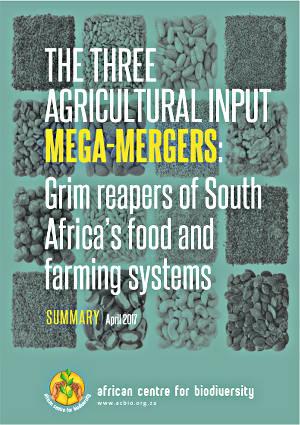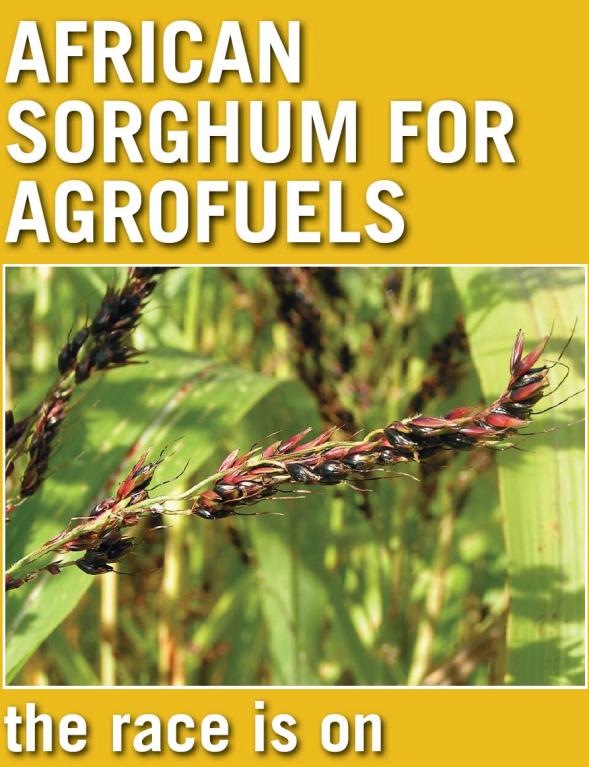Latest Resources

10 August 2017
The Water Efficient Maize for Africa Project: Profiteering not Philanthropy
This scoping study aims to appraise, to the best of our knowledge, the current status of the roll-out of a public- private partnership which forms the the Water Efficient Maize for Africa (WEMA) project in five African countries: Kenya, Mozambique, South Africa, Tanzania and Uganda. The partnership is between the African Agricultural Technology Foundation (AATF), […]

11 April 2017
Mega-mergers: 3 giant corporations controlling South Africa’s food and farming systems
This briefing deals with the three mega mergers taking place in the agriculture sector as Dow Chemical and DuPont are set to merge, China National Chemical Corporation (ChemChina) is to acquire Syngenta and Bayer is to acquire Monsanto. The proposed Bayer-Monsanto merger will give control of almost 30% of the world’s commercial seed market and […]

28 November 2016
Biosafety aspects of genome-editing techniques
Biosafety TWN Briefing – Biosafety aspects of genome-editing techniques. You can download the paper here.

9 March 2011
How US sorghum seed distributions undermine the FAO Plant Treaty’s Multilateral System
New data from ICRISAT and the US Department of Agriculture and a comparison of genebank records indicates that half of more of ICRISAT’s sorghum genebank collection is also being distributed outside of the Multilateral System. This yawning gap creates an economic incentive for the Multilateral System and its benefit-sharing requirements to be avoided. USDA’s sorghum […]

16 February 2011
African Millet Under Threat
The African Centre for Biosafety (ACB) has focused several recent reports on new international commercial interest and patent claims on the African native crop sorghum. This includes the issues raised by the proposed widespread use of sorghum for the production of agrofuels. This report extends ACB’s examination of new international commercial interest in African native […]

4 February 2011
Sorghum and the Antioxidant Craze: What Benefit for Africa’s Farmers?
A highly successful health food company in the United States, Silver Plate Inc, is seeking to cash in on the health benefits of sorghum. More particularly, it has begun to commercialize foods rich in sorghum anthocyanins, natural “antioxidant” chemicals found in some strongly coloured plant foods that are believed to have heart and other health […]

31 January 2011
Water Efficient Maize for Africa: Pushing GM Crops onto Africa
This paper looks at the Water Efficient Maize for Africa (WEMA) project within the context of the race by massive agribusiness corporations to bring climate change related crops to the market. The first part of the paper explains the WEMA project within this context, outlining the players and the stakes involved. It looks at who […]

28 October 2010
Synthetic Biology in Africa: Recent Developments
By Gareth Jones and Mariam Mayet The focus of this paper is the emerging field of synthetic biology, in particular its implications for the African continent. Synthetic biology combines a number of scientific disciplines and is generally understood to involve the deliberate design of biological systems, using standardised components that have been created in a […]

12 March 2010
African Sorghum for agrofuels: the race is on
Author: Edward Hammond About the briefing: The interlocking problems of climate change, emissions from fossil fuels, and limited oil reserves have stimulated interest worldwide in the use of plant crops to produce fuel. Agrofuels are not a new idea. Brazil, for instance, has used them on a large scale for many years. The potential scale […]

13 January 2010
Africa’s Green Revolution Drought Tolerant Maize Scam
Prediction of exacerbated drought in Africa due to climate change is apparently the driving force behind the establishment of the Water Efficient Maize for Africa (WEMA) initiative, another prong of the so-called ‘New Green Revolution for Africa’ WEMA seeks to develop drought tolerant maize varieties through a program which is being presented as a panacea […]
